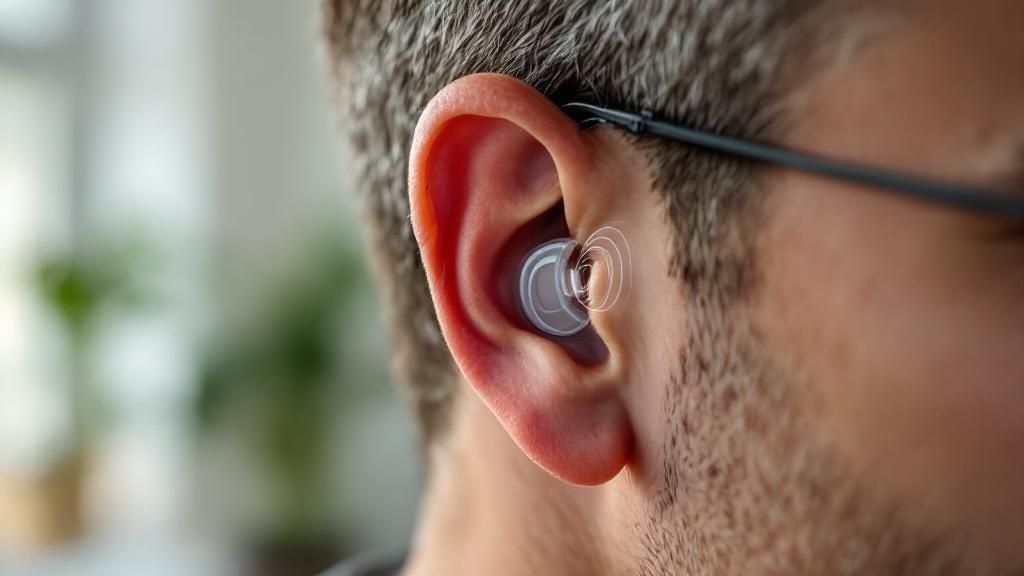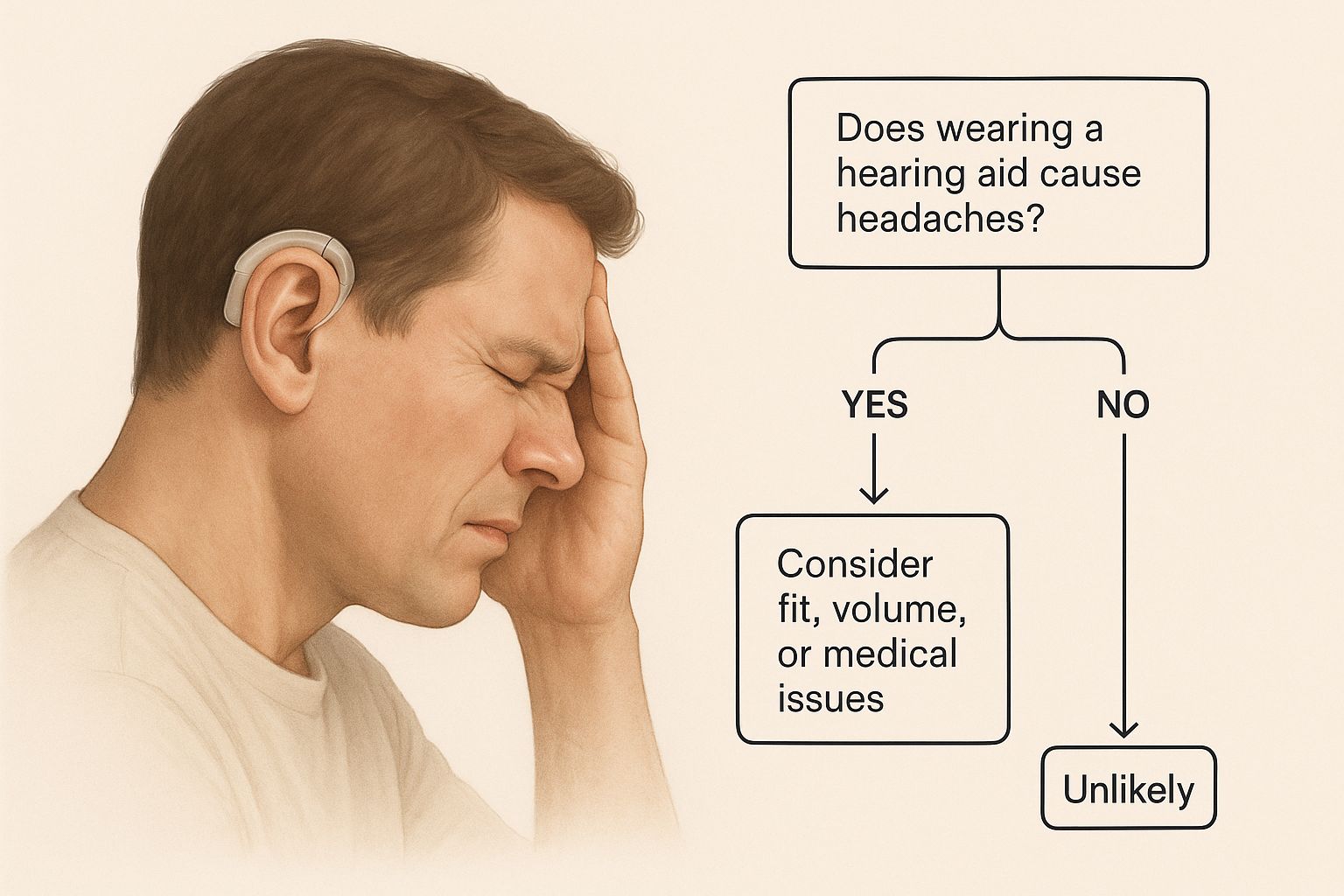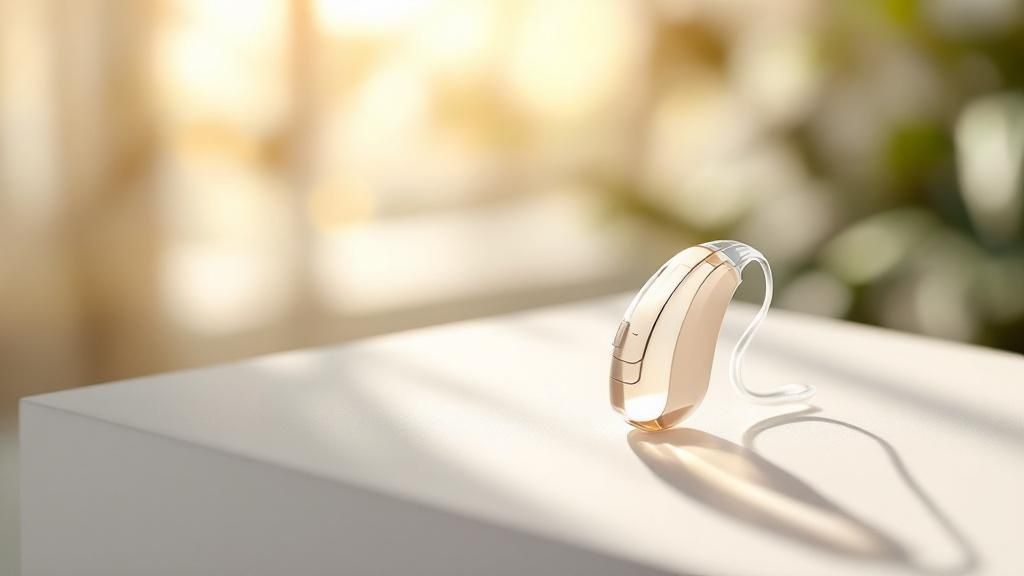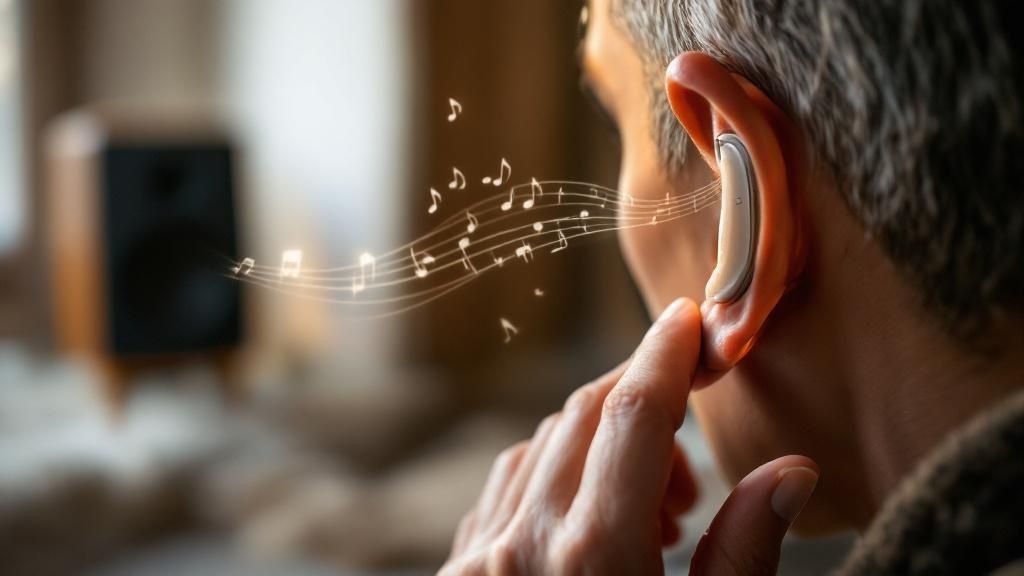You've just stepped into a world brimming with sound. The gentle hum of the refrigerator, the crisp rustle of leaves, the nuanced tones in a loved one's voice—it's all coming back. But along with this vibrant new soundscape, something else arrives. A subtle, disorienting feeling. A sense of unsteadiness, as if the ground beneath you has softened. You start to wonder, can hearing aids cause dizziness?
The answer is yes. And that initial feeling of imbalance is not just common; it's a profound signal that your brain is waking up. After years of living in a muffled world, your mind is furiously rewiring itself to process this magnificent flood of information. Think of this dizziness not as a problem, but as the first, powerful step in a remarkable transformation.
The First Shockwave: Why Your Brain Reels From the Sound
Picture this: you've been in a dimly lit room for years. Your eyes have adjusted to the shadows, learning to navigate by faint outlines. Then, suddenly, someone throws open the curtains on a brilliant, sunny day. The sheer intensity of the light is overwhelming, almost painful. You might even stumble for a moment, disoriented.
This is precisely what your brain experiences with new hearing aids. For years, it has strained to make sense of a quiet, faded world. Now, it's being hit with a tidal wave of rich, detailed sound it had forgotten existed. This sensory explosion can momentarily short-circuit your equilibrium, making you feel as if you're finding your "sea legs" on a rocking ship. It's not a malfunction; it's a testament to your brain's incredible power to adapt.
A Hidden Partnership: The Deep Connection Between Sound and Balance
Tucked away in the intricate labyrinth of your inner ear, your auditory (hearing) system and your vestibular (balance) system are not just neighbors; they are intimate partners. They share the same delicate neural pathways, whispering back and forth constantly. When one is suddenly jolted with new, intense activity, the other feels the aftershocks.
Here’s the secret story of what’s happening inside your head:
- The Awakening: Your hearing aids deliver sounds your brain hasn't heard clearly in years. It's like a forgotten language suddenly being spoken fluently.
- The Scramble: Your brain kicks into overdrive, a flurry of neural activity as it struggles to interpret this new audio world.
- The Crossed Wires: This intense mental effort spills over, sending confusing signals down the shared highway to your balance system, triggering that dizzy, unsteady sensation.
This is also why it's critical to understand the chasm between true, programmed hearing aids and simple sound amplifiers. One is a key, custom-cut for the unique lock of your hearing loss. The other is a sledgehammer. You can dive deeper into the vital differences between hearing aids vs. hearing amplifiers in our guide.
The crucial insight here is that the initial dizziness is your brain's way of saying, "Wait, I'm rebuilding. Give me a moment." It's laying down new pathways to bring you a richer, fuller experience of the world. This isn't a red flag; it's the beautiful, messy beginning of your journey back to sound.
To prepare you for this journey, we've mapped out the first week. What should you expect as your brain begins to heal?
A Traveler's Guide: Mapping Your First Week of Reconnection
Discover the common sensations you'll feel as your brain rewires itself, and understand the secret meaning behind them.
| Sensation | The Secret Story | The Expected Timeline |
|---|---|---|
| Dizziness or Unsteadiness | Your brain is learning to dance again, synchronizing the new music of sound with the rhythm of your body's balance. | A few days to a week for most. The ship will steady. |
| Sounds Seem "Too Loud" | Your brain is recalibrating its internal volume knob, rediscovering what "normal" truly sounds like after years of silence. | Typically 3-5 days as your brain finds its new baseline. |
| Mental Fog or Fatigue | Your brain is running a marathon, processing more information in a day than it has in years. It's an exhilarating, but tiring, workout. | The first week feels like a climb; it gets easier with every step. |
| Your Own Voice Sounds Alien | You're hearing yourself through a new, crystal-clear channel for the first time. Your brain must learn to recognize this stranger's voice as its own. | Usually improves dramatically within 1-2 weeks. |
Patience is the secret ingredient during this phase. These feelings are the echoes of your brain actively healing, forging new connections to the world. But if these sensations scream instead of whisper, or linger for more than a couple of weeks, it's time to check in with your audiologist.
The Unseen Link: How Hearing Governs Your Stability

Deep within your skull, a breathtaking dance is happening every second of your life. Your hearing and balance systems are not just connected; they are woven from the same thread, sharing delicate nerve pathways in the inner ear. Imagine them as two dancers in a complex ballet—when one falters, the other is pulled off-balance.
This is the hidden truth behind your unsteadiness. When hearing loss begins, the world's soundtrack fades. Your brain grows accustomed to this muted reality, but the profound connection to your sense of balance never truly breaks.
So when you put on hearing aids, you’re not just turning up the volume. You are sending a lightning bolt of energy through a system that has been dormant. This sudden sensory flood sends ripples down those shared neural highways, creating a temporary storm in your sense of equilibrium. It’s a sign of life, of reconnection.
The Great Unmasking: Did the Dizziness Exist All Along?
What if the dizziness wasn’t caused by your hearing aids at all? What if, instead, the devices were simply pulling back a curtain on a balance issue that was already there, hiding in the shadows of silence?
This is more common than you could possibly imagine. Untreated hearing loss can act as a mask, hiding subtle balance problems. Your brain, deprived of clear auditory cues, simply learns to compensate. But once you introduce crisp, clear sound, those hidden instabilities are exposed.
The link is so undeniable that symptoms often appear in clusters. It is a well-documented medical fact that hearing loss, tinnitus, and dizziness often travel together, a trio of issues originating from the same delicate structures in your ear.
A revealing study uncovered just how deeply these symptoms are intertwined, discovering that 28% of participants reported experiencing more than one of these issues simultaneously. The data confirms a physiological truth: feeling dizzy while having hearing loss is not a coincidence, but a common reality. You can explore the fascinating findings on the coexistence of hearing and balance symptoms for yourself.
In this light, your new hearing aids transform into a powerful diagnostic tool. While restoring your hearing, they are also revealing hidden vulnerabilities, giving you the power to address them directly. This is not just a journey to better hearing, but a path to greater stability, confidence, and safety in your life.
The Prime Suspect: Is It the Device or a Deeper Clue?
When that dizzy, world-tilting feeling strikes, your first instinct is to blame the new object in your ear. And sometimes, you'd be right.
A hearing aid that fits imperfectly can exert a subtle, continuous pressure on your ear canal, sending a stream of confusing signals to your brain's balance center next door. Or, if the sound settings are too powerful from the start, the sudden sensory onslaught can be completely overwhelming.
The good news? These device-related issues are almost always easily corrected by your hearing provider. This is precisely why beginning your journey with professionally fitted, high-quality devices is not just a preference, but a necessity. You can discover what to look for in our essential guide to FDA-approved hearing aids.
This chart will help you become a detective, uncovering the real source of your unsteadiness.

By following these clues, you can start to understand whether you need a simple tweak to your device or if your body is revealing a deeper story.
The Plot Twist: Are Hearing Aids the Cure, Not the Cause?
Now, let's flip the entire story on its head. What if the hearing aids aren't the problem, but are actually a crucial part of the long-term solution? It's a known fact that untreated hearing loss is a significant risk factor for falls and balance problems, as it starves your brain of the spatial sound cues it needs to navigate the world.
So, could your hearing aids actually be causing the dizziness? The scientific evidence is fascinatingly complex. One massive 11-year study found that while people with hearing loss were indeed more likely to fall, wearing hearing aids didn't significantly change that risk. Another huge analysis of over 150,000 individuals found the exact same thing—hearing aids neither increased nor decreased the odds of a dizzy spell leading to a fall.
What does this unlock for you? It powerfully suggests the dizziness is less about the device in your ear and more about the incredibly intricate relationship between your hearing and your brain. Your hearing aids are not the villain; they are the catalyst, jumpstarting a vital process of reconnection that is absolutely essential for your long-term stability and safety.
An Inevitable Dance: Why Age Magnifies the Sensation

As the years pass, the delicate systems governing our hearing and balance undergo a natural, graceful transformation. Imagine your inner ear as a masterful clock, ticking away perfectly for decades. It's only natural for some of its intricate gears to show signs of a long and well-lived life.
This is why hearing loss and a sense of unsteadiness often emerge as companions on the journey of aging. It's not a coincidence; it’s a direct consequence of the profound, physical connection between your auditory (hearing) and vestibular (balance) systems. Both can grow more sensitive over time.
This means that, in many cases, a subtle imbalance was already present, a quiet passenger you’d learned to live with long before hearing aids entered your world.
A Brilliant Light: Revealing What Was Always There
Putting on hearing aids for the first time is like stepping into a familiar room and flipping on a powerful light. You’ve navigated this space in twilight for years, but now, every detail is revealed in stunning clarity. This flood of new sound doesn't create an imbalance—it illuminates the quiet unsteadiness your brain had skillfully learned to ignore.
This experience is not a sign that something is wrong. In fact, it's often a sign that everything is going right. Your hearing aids are working so effectively that your brain is finally receiving enough auditory data to recognize the mismatch between what it hears and how your body feels in space.
This hidden connection is powerfully documented. Among older adults seeking help for dizziness, hearing loss is an incredibly common finding. One landmark study focusing on patients aged 60-69—a group that accounted for over 60% of vertigo cases—found that roughly 20% also had hearing loss. This underscores the undeniable link between these two systems. You can read more about the powerful link between hearing and balance in aging adults.
Understanding this changes everything. The feeling you're experiencing is a normal, healthy part of your brain's re-calibration. Your mind and body are simply learning to communicate again with this new, richer stream of sound—a journey that leads not to instability, but to a profound new sense of balance.
The Path Forward: How to Reclaim Your Equilibrium
Understanding the why behind your dizziness is liberating. Now, let's explore the practical, powerful steps you can take to guide your brain through this transition and find your footing in this new world of sound.
This isn't a battle against the sensation of dizziness. It's a gentle process of re-education. And the golden rule is simple: Start low and go slow.
Resist the urge to wear your new hearing aids for eight hours straight on day one. That’s like trying to run a marathon after months of sitting on the couch. It’s too much, too soon.
Instead, ease into the experience. Begin by wearing your devices for just an hour or two in a quiet, safe environment, like your own home. Let your brain slowly acclimate to the gentle sounds of your own footsteps, the hum of the air conditioner. As your comfort grows, gradually extend the time and venture into more complex soundscapes.
The Brain's Workout: Simple Exercises to Re-Sync Your Systems
Just as physical exercise strengthens your muscles, specific movements can retrain your brain's sense of balance. A few simple, safe exercises can accelerate the adaptation process, helping your auditory and vestibular systems find their harmony again.
Here are two gentle exercises to try in a safe space at home:
- One-Leg Stands: Position yourself next to a sturdy counter or chair for support. Lift one foot from the floor and hold the position for up to 30 seconds. Then, switch to the other side. This simple act powerfully reinforces your body's connection to its center of gravity.
- Heel-to-Toe Walks: In a clear hallway, walk a straight line, carefully placing the heel of one foot directly in front of the toes of the other. There's a reason it's a classic sobriety test—it directly challenges and strengthens your brain's balance-control centers.
These small, consistent actions send a powerful message to your brain.
Remember, the goal here is gentle recalibration. You are teaching your brain to trust the new, clear sound signals it's receiving and seamlessly integrate them with your body's sense of motion and place in the world.
The Art of Translation: Speaking Your Audiologist's Language
If the dizziness persists beyond a week or two, it's time to connect with your hearing specialist. The way you describe what you're feeling can make the difference between a quick fix and continued frustration.
Don't just say, "I feel dizzy." Go deeper. What does it actually feel like?
- "The world seems to spin for a second whenever I turn my head quickly."
- "I feel unsteady, like I'm walking on a soft mattress."
- "The dizziness spikes in loud, chaotic places like the grocery store."
This rich detail is like a treasure map for your audiologist. It helps them pinpoint whether they need to soften the programming, check the physical fit, or recommend further evaluation. Your experience is the key that unlocks the perfect adjustment.
The Critical Moment: When to Raise a Red Flag
A fleeting sense of unsteadiness in the first few days is one thing. Persistent dizziness is another. Think of it as your body’s check-engine light—a clear signal that demands professional attention. If that off-balance feeling lingers for more than a couple of weeks, or if it feels severe from the very beginning, it's time to make the call.
This is not an admission of defeat. It's a proactive, intelligent step toward perfecting your hearing experience. Your audiologist has guided countless people through this exact same phase. What feels like an insurmountable obstacle to you is often a simple, five-minute adjustment for them.
Ultimately, you are the foremost expert on your own body. Trust your intuition. If something feels wrong, it probably is.
Signals You Cannot Ignore
Certain symptoms should immediately move "call the audiologist" to the very top of your list. These are not "wait-and-see" situations. They are clear indicators that you need a professional evaluation without delay:
- Persistent Dizziness: The sensation does not fade or improve after one to two weeks of wearing the devices consistently.
- Severe Vertigo: You experience intense episodes where the room itself feels like it is spinning violently around you.
- Symptom Clusters: The dizziness is accompanied by other issues like nausea, vomiting, sudden vision changes, or intense headaches.
- Sudden Hearing Changes: You notice an abrupt, significant drop in your ability to hear in one or both ears.
During your follow-up, your audiologist will likely start with the simplest solutions. They may reprogram the devices with a gentler sound profile or examine the physical fit to eliminate any pressure points inside your ear canal.
The fix might be as simple as a software tweak. Or, your audiologist might suspect an underlying vestibular issue and recommend you see a specialist. Either way, by making that call, you are taking a crucial step toward a safer, more stable, and more enjoyable hearing experience.
Knowing when to self-manage and when to seek expert guidance is the key to success. If you're just starting to explore your options, our definitive guide on how to buy hearing aids provides a clear, supportive roadmap for your entire journey.
Unlocking the Mystery: Questions Everyone Asks About Dizziness
Entering the world of hearing aids is a journey filled with new sensations, and it's only natural to have questions. Let's demystify some of the most common concerns that arise when dizziness enters the picture.
How Long Until the World Stops Spinning?
For the vast majority of new hearing aid users, that initial sensation of unsteadiness is a fleeting chapter. It typically vanishes within a few days to a couple of weeks as your brain adapts to the rich new world of sound. Think of it as your brain recalibrating its internal GPS.
But remember this critical guideline: if the feeling lasts longer than two weeks or feels intense and overwhelming from day one, that's your signal. It's time to connect with your hearing specialist for a follow-up.
Could the Shape of My Hearing Aid Be the Culprit?
It's a definite possibility. The physical fit of a device, especially in-the-ear models, can sometimes play a role. If a hearing aid is fitted improperly, it can create a very slight but constant pressure inside your ear canal.
That tiny amount of pressure is enough to send confusing signals to your balance system right next door. Your audiologist can easily check the fit and make subtle adjustments to ensure it sits perfectly, which often resolves the issue entirely.
Is There Anything I Can Do to Speed This Up?
Absolutely. You can actively help your brain and body resynchronize with simple, gentle balance exercises at home. These small movements can help recalibrate your sense of equilibrium and may significantly shorten the adjustment period.
Try these two safe and effective options:
- One-Leg Stands: While holding onto a sturdy counter or chair for support, simply try standing on one leg for up to 30 seconds before switching to the other.
- Heel-to-Toe Walks: In a clear hallway, walk a straight line by placing the heel of one foot directly against the toes of the other.
A quick note of caution: always consult with your doctor before starting any new exercises, especially if your dizziness is severe. They can ensure these movements are safe and appropriate for you.
At HearDirectClub, we believe your journey to better hearing should be one of clarity and confidence, not confusion. Our team is dedicated to supporting you at every step, from understanding your new devices to ensuring they feel like a natural part of you. Explore our nearly invisible, FDA-registered hearing solutions today.





Leave a comment
This site is protected by hCaptcha and the hCaptcha Privacy Policy and Terms of Service apply.